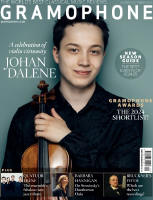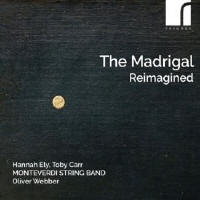Texte paru dans: / Appeared in:
|
|
|
|
|
|
The works not new to the catalogue include a psalm-setting by an earlier Leipzig Thomaskantor, Johann Schelle, rich with imposing and expressive contrapuntal writing for five-part choir and strings, not unreminiscent of grands motets by Lully and Delalande; it seems unlikely that Bach would have been unresponsive to this kind of quality. Adam Drese’s Nun ist alles überwunden touchingly bids a gentle farewell to life, a philosophical vein often mined by Bach. (The booklet note, by the way, proposes that the piece is more likely to be by the other Drese, Adam’s cousin.)
The 12 voices of Voces Suaves are sonorous, clear and precise in ensemble. They are a little weaker as soloists, and there are places where their focus seems to wander and you feel a conductor might have brought out more effective results; the downward-plunging bass line in the final cadence of Michael Bach’s motet surely calls for more aplomb than it gets here. The strings of the Akademie für Alte Musik Berlin, stoutly reinforced in the bigger pieces by a bassoon, offer the kind of skilled support we expect, and have their own moments in two of Pachelbel’s delectable suites-cum-variation sets, prettily performed if again begging a firmer grip on forward momentum. But this is attractive stuff, and a satisfying release overall. Lindsay Kemp
‘The Madrigal Reimagined’ Caccini Io che dal ciel Cavaliere O che nuovo miracolo G Gabrieli Canzon prima a 5 Malvezzi Sinfonia a 6 Merulo Canzon decimottava Monteverdi Il ballo delle ingrate (excs). Cruda Amarilli. Orfeo (excs) Nauwach Cruda Amarilli Palestrina Vestiva i colli Rore Anchor che col partire. Ben qui si mostra il ciel. Hor che ’l ciel et la terra. Vergine bella Tracetti Preludium in G Hannah Ely sop Toby Carr lute/theorbo Monteverdi String Band / Oliver Webber vn Resonus (RES10341 • 64’ • T/t)
It didn’t take long for the madrigal to become a vehicle for all manner of experimentation – reworkings of texts associated with particularly influential ones or written-out diminutions (ornaments) for both voices and instruments of the genre’s greatest hits. Fronted by soprano Hannah Ely, the Monteverdi String Band nicely evoke that variety of approaches. Ely sings with warmth and poise, best heard in ‘Ahi, troppo è duro’ in the set excerpted from Monteverdi’s Ballo delle ingrate. As one of those who established the madrigal as a genre to be reckoned with (and was acknowledged as a major influence by Monteverdi himself), Rore features prominently: violinist Oliver Webber contributes diminutions to two of his madrigals as well as performing some by his contemporaries. Instrumental interludes are culled from famous places, such as the concluding ballo from the Florentine Intermedii of 1589, which is ornamented tastefully. The flow of the recital is pleasing and logical musically, avoiding the didactic approach where ‘original’ and variations follow each other unrelentingly. Whether it truly attains to sprezzatura, the casual yet flashy extroversion so prized by commentators of the time, is debatable: unless the pulse is treated flexibly rather than strictly (as here), that quality is very hard to achieve. Much of the diminution-work here feels cautious rather than embodied.
The set from the Ballo delle ingrate works well, but the choice to close with 12 minutes from Orfeo is baffling. Granted, the prologue works well on its own (though the opening sinfonia is shorn of its tripartite structure) but the same cannot be said of the chorus rendering of ‘Ahi caso acerbo’ (for which Ely is accompanied by the string band), which comes out of the blue, giving the soprano no dramatic platform from which to launch it. Yes, the opera’s strategies were forged in the crucible of Monteverdi’s experiments with the madrigal, but that insight requires more practical illustration than these mostly minute-long excerpts afford. |
|




